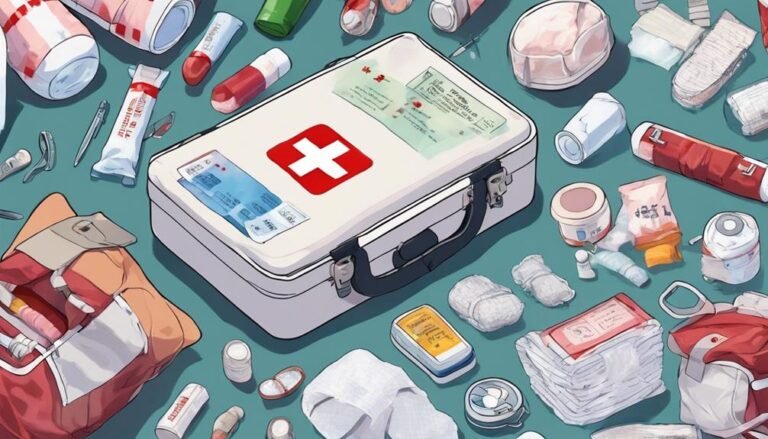How to Be More Skilled at Balancing Clinical and Administrative Duties
In the fast-paced healthcare environment, striking a harmonious balance between clinical responsibilities and administrative tasks can be akin to walking a tightrope. Imagine a scenario where your days flow seamlessly, patient care is excellent, and paperwork doesn't pile up like a mountain.
How can you achieve this elusive equilibrium without sacrificing quality or your well-being? By implementing practical strategies and adopting a mindful approach, you can navigate the intricate dance between hands-on care and organizational duties with finesse.
Let's explore actionable steps to enhance your proficiency in both areas.
Key Takeaways
- Establish clear priorities based on deadlines and impact.
- Foster team collaboration and communication for efficient outcomes.
- Utilize technology and automation for streamlined workflow.
- Invest in continuous learning and process optimization for success.
Establish Clear Priorities
Establish clear priorities by creating a list of tasks ranked in order of importance based on deadlines and impact on patient care. Time prioritization is vital in balancing clinical and administrative duties effectively. Begin by evaluating the urgency and significance of each task to determine where to allocate your focus first. This approach guarantees that critical patient care needs are met promptly while also addressing administrative responsibilities in a timely manner.
Effective communication is key in this process. By clearly articulating expectations with your team, you can make sure everyone is on the same page regarding priorities. This helps prevent misunderstandings and guarantees that tasks are completed efficiently. Additionally, clear expectations promote accountability and teamwork, fostering a collaborative environment where everyone understands their role in achieving common goals.
Balancing tasks requires constant reevaluation and adjustment. As new priorities emerge or deadlines shift, be prepared to adapt your task list accordingly. Regularly reviewing and updating your priorities will help you stay organized and focused on what matters most in providing quality patient care.
Improve Time Management Skills
Improving your time management skills is essential for balancing clinical and administrative duties effectively.
Prioritize tasks based on urgency and importance, utilize scheduling tools to organize your day efficiently, and don't hesitate to delegate tasks when necessary.
Prioritize Tasks Effectively
To effectively prioritize tasks and improve your time management skills, begin by creating a detailed list of all your responsibilities and deadlines. Task prioritization is key to balancing responsibilities efficiently.
Once you have your list, categorize tasks based on urgency and importance. Tackle high-priority tasks first to guarantee essential duties are met. Consider using techniques like the Eisenhower Matrix to distinguish between urgent and important tasks.
Break down larger tasks into smaller, manageable steps to prevent feeling overwhelmed. Utilize tools such as to-do lists or digital task managers to keep track of deadlines and progress.
Utilize Scheduling Tools
To enhance your time management skills and effectively balance your clinical and administrative duties, consider integrating scheduling tools into your workflow. These tools can help you stay organized and make the most of your time. Here are some time-saving tips and organizational tools to assist you:
- Calendar Apps: Use digital calendars to schedule appointments, set reminders, and plan your day efficiently.
- Task Management Platforms: Utilize platforms like Trello or Asana to create task lists, prioritize assignments, and track your progress.
- Appointment Scheduling Software: Implement tools like Calendly or Setmore to streamline booking processes and avoid double bookings.
- Time Tracking Apps: Monitor how you spend your time with apps like Toggl or RescueTime to identify areas where you can improve efficiency.
Delegate When Necessary
Consider delegating tasks when necessary to enhance your time management skills and maintain a balanced workload.
Effective task delegation is vital for optimizing productivity and focusing on high-priority responsibilities. Start by identifying tasks that can be assigned to others without compromising quality.
Prioritize tasks based on urgency and importance, then delegate those that can be handled by colleagues or support staff. Clearly communicate expectations, deadlines, and any specific instructions to guarantee successful task completion.
Regularly follow up on delegated tasks to track progress and provide guidance if needed. By mastering the art of task delegation, you can free up valuable time, improve efficiency, and concentrate on critical clinical and administrative duties, ultimately achieving better time management.
Delegate Tasks Effectively
When delegating tasks effectively, remember to assign clear responsibilities to each team member and encourage collaboration among them.
By providing specific instructions and expectations, you can guarantee that tasks are completed efficiently and accurately.
Building a culture of mutual support and communication within your team fosters a productive work environment.
Clear Task Assignments
Efficiently delegate tasks to guarantee smooth workflow and effective time management within your clinical and administrative responsibilities.
- Clearly outline the task requirements, deadlines, and expectations to avoid misunderstandings.
- Match tasks to team members based on their strengths and expertise for best results.
- Provide necessary resources and support to ensure successful task completion.
- Regularly check in with team members to monitor progress, offer assistance, and address any challenges promptly.
Encourage Team Collaboration
To foster a culture of collaboration and enhance task delegation effectiveness, encourage open communication and mutual support among team members. Team building is essential for a successful work environment. By fostering a sense of unity and shared purpose, team members are more likely to work together effectively.
Communication plays an important role in team collaboration. Encourage your team to openly share information, ideas, and concerns. Synergy is achieved when team members work together seamlessly, combining their strengths to achieve common goals.
Effective delegation isn't just about assigning tasks but also about building a cohesive team that can work harmoniously towards shared objectives. By promoting collaboration and communication, you create a positive work environment where tasks are delegated efficiently and completed successfully.
Utilize Technology for Efficiency
Incorporate technological tools into your daily workflow to streamline processes and enhance productivity. Here are four ways you can leverage technology for efficiency improvement:
- Technology Integration: Integrate electronic health records (EHR) and practice management systems to centralize patient information, appointments, and billing processes in one place. This integration eliminates the need to switch between multiple systems, saving you time and reducing errors.
- Automation: Implement automation tools for repetitive tasks such as appointment reminders, prescription refills, and lab result notifications. Automation can help free up your time to focus on more critical clinical tasks while ensuring that important administrative duties are still being handled efficiently.
- Workflow Optimization: Use task management applications to create to-do lists, prioritize tasks, and track progress on assignments. By optimizing your workflow with these tools, you can stay organized, meet deadlines, and prevent important tasks from falling through the cracks.
- Telehealth Solutions: Embrace telehealth platforms for virtual consultations, follow-ups, and monitoring. Telehealth can not only expand your reach to patients but also streamline the process of providing care, making it more convenient for both you and your patients.
Enhance Communication With Team
To enhance communication with your team, guarantee clear expectations are set to avoid misunderstandings.
Foster open dialogue where team members feel comfortable sharing thoughts and concerns.
Utilize regular check-ins to stay updated on progress and address any issues promptly.
Clear Team Expectations
Enhance team communication by establishing clear and concise expectations for all members. This is important for team alignment and performance. To achieve this, follow these steps:
- Define Roles: Clearly outline each team member's responsibilities and expectations to guarantee role clarity.
- Set Goals: Establish measurable objectives that align with organizational targets to drive accountability.
- Provide Feedback: Offer regular feedback to keep everyone informed about their performance and areas of improvement.
- Encourage Questions: Create an environment where team members feel comfortable asking for clarification, promoting open communication channels.
Foster Open Dialogue
Establishing open dialogue within your team is key to fostering effective communication and collaboration. Open communication plays an essential role in enhancing team dynamics, ensuring that everyone is on the same page and working towards common goals.
By encouraging team members to express their thoughts, ideas, and concerns openly, you create a supportive environment where everyone feels heard and valued. This transparency can lead to smoother conflict resolution and stronger team building.
Actively listening to each other, providing constructive feedback, and being open to different perspectives are vital components of fostering open dialogue. By promoting a culture of communication within your team, you can strengthen relationships, boost morale, and improve overall team performance.
Utilize Regular Check-Ins
Regular check-ins with your team provide a valuable opportunity to enhance communication and promote collaboration effectively. When utilizing regular check-ins, consider the following:
- Regular Feedback: Offer consistent feedback during these check-ins to keep your team informed about their performance and progress.
- Encourage Team Communication: Use these sessions to encourage open communication among team members, fostering a collaborative environment.
- Discuss Performance: Address individual and team performance metrics during these check-ins to identify areas for improvement and celebrate successes.
- Enhance Collaboration: Utilize check-ins to discuss upcoming projects, delegate tasks effectively, and make sure everyone is aligned towards common goals.
Streamline Administrative Processes
To streamline administrative processes effectively, prioritize digitizing paperwork and implementing automated systems where feasible. Automation implementation can greatly improve efficiency by reducing manual errors and saving time.
Begin by identifying repetitive tasks that can be automated, such as appointment scheduling or billing processes. Look into software solutions that can streamline these tasks, freeing up time for more important responsibilities.
Process simplification is key; assess the current workflow and eliminate any unnecessary steps or redundancies.
Workflow enhancement is another important aspect of streamlining administrative processes. By optimizing how tasks flow from one department to another, you can improve overall efficiency and communication. Regularly review and update these processes to make sure they remain effective.
Invest in Professional Development
To enhance your effectiveness in managing a healthcare setting, valuable investment in professional development can greatly contribute to your growth and adaptability in the ever-evolving field. Here are some ways you can invest in your professional development:
- Attend Professional Development Opportunities: Make sure to participate in conferences, seminars, and workshops to stay updated with the latest trends and best practices in healthcare management.
- Engage in Networking Events: Connecting with other professionals in the industry can provide you with valuable insights and potential collaborations that can enhance your skills and knowledge.
- Enroll in Skill Building Workshops: Join workshops that focus on specific skills like leadership, communication, or data analysis to strengthen your capabilities in both clinical and administrative tasks.
- Take Online Courses: Online courses offer flexibility and a wide range of topics, allowing you to deepen your expertise in areas relevant to your role in healthcare management.
Implement Effective Scheduling Strategies
For more efficient management of your healthcare facility, implementing effective scheduling strategies is essential to optimize productivity and guarantee smooth operations. By incorporating time blocking and team coordination techniques, you can make sure that appointments, tasks, and meetings are organized efficiently throughout the day. Calendar synchronization and staff coordination are vital to avoid double bookings and make certain that the right staff members are available for patient care or administrative duties.
To help you visualize the benefits of effective scheduling strategies, the table below outlines key points to ponder:
| Scheduling Strategies | Description |
|---|---|
| Time Blocking | Allocate specific time slots for different tasks to increase focus and efficiency. |
| Team Coordination | Communicate effectively with your team to align schedules and responsibilities. |
| Calendar Synchronization | Keep all calendars updated and synchronized to avoid conflicts in scheduling. |
| Staff Coordination | Make sure the availability of necessary staff members for various tasks and appointments. |
| Prioritization | Identify and prioritize critical tasks to manage time effectively and meet deadlines. |
Practice Self-Care and Stress Management
Implementing effective scheduling strategies in your healthcare facility is just the first step towards ensuring smooth operations; now, it's important to shift focus onto practicing self-care and stress management.
- Prioritize Self-Care: Make time for activities you enjoy outside of work. Engage in hobbies, exercise, or spend time with loved ones to recharge.
- Utilize Stress Relief Techniques: Incorporate mindfulness practices, deep breathing exercises, or meditation into your daily routine to help manage stress levels effectively.
- Maintain Work-Life Balance: Set boundaries between work and personal life. Disconnect from work emails or calls during off hours to prevent burnout and maintain a healthy balance.
- Prevent Burnout: Recognize signs of burnout such as exhaustion or cynicism. Take regular breaks, delegate tasks when possible, and seek support from colleagues or mental health professionals if needed.
Seek Feedback and Continuous Improvement
Seeking feedback and embracing continuous improvement are key components in enhancing the efficiency and quality of your healthcare practice. Establishing a feedback culture within your team fosters an environment where open communication thrives. Encourage your colleagues to provide constructive criticism on your clinical and administrative tasks. Guarantee feedback as a tool for skill development, as it offers valuable insights into areas that may benefit from improvement.
Continuous improvement is a dynamic process that involves constantly evaluating and refining your practices. Actively seek opportunities to enhance your clinical skills and administrative processes. Stay informed about the latest advancements in healthcare technology and regulations to secure that your practice remains efficient and compliant. Implement changes based on feedback received, and monitor the outcomes to assess the effectiveness of the improvements made.
Conclusion
To sum up, by following these tips, you can become a master at balancing clinical and administrative duties.
Remember, Rome wasn't built in a day, so don't expect to become a pro overnight.
With practice and determination, you can juggle tasks like a circus performer, effortlessly managing both clinical and administrative responsibilities.
Keep pushing yourself to improve, and soon you'll be a well-rounded healthcare professional who excels in all aspects of your role.







